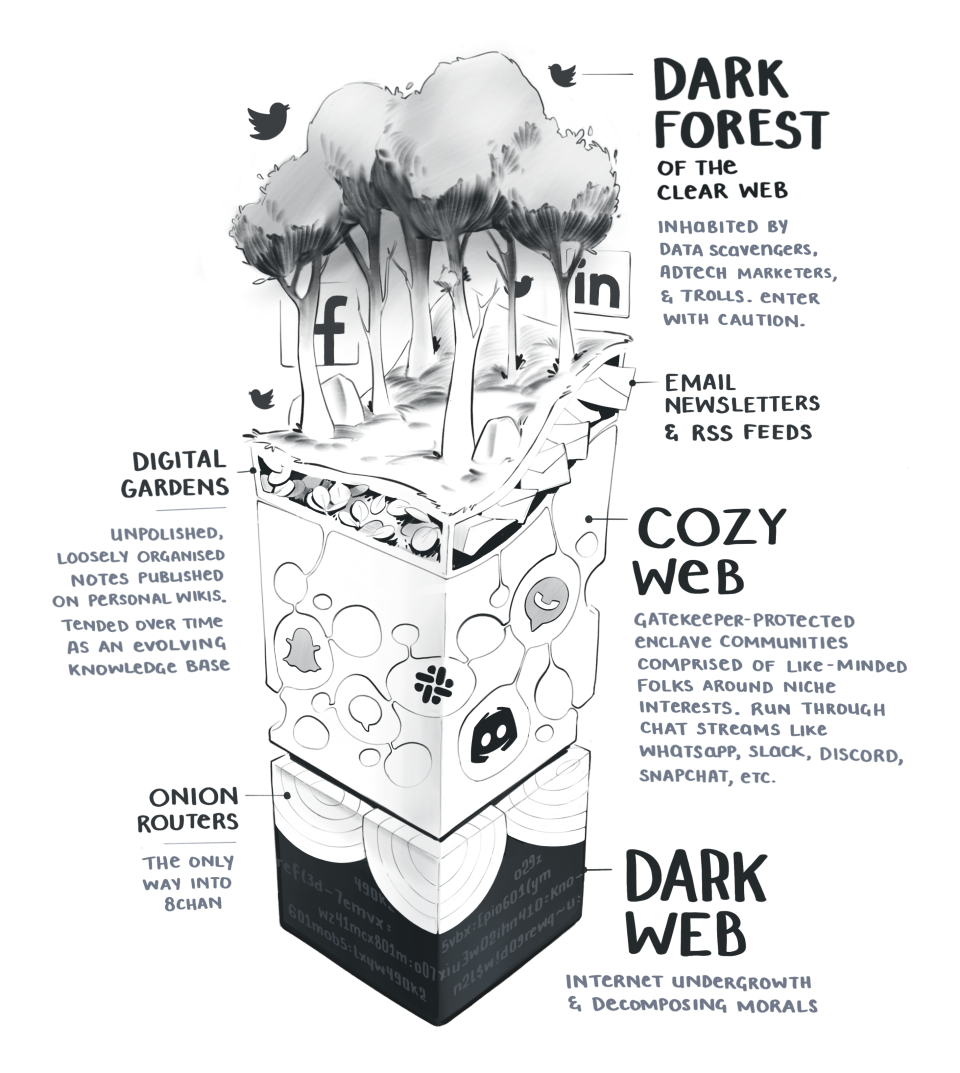
The Village Effect of the Greater Web
The internet is a vast and open plain. It represents the best account we have of the human condition (it's also really fun and interesting once you know your way around). So why does it feel so cramped in here? Why are so many of us confined to a handful of apps? I turned to M. Night Shyamalan's The Village for some answers. Why? Because we're having fun!
Warning: This post is another “forest as a metaphor for the web” exploration. If you are sensitive to the further beating of this horse, proceed with caution.
Meta, Google, TikTok, and Twitter. Some refer to this collective as the “corporate web,” while others gift it a more sinister term— The Dark Forest.
The Dark Forest theory can get a little fuzzy in the abstract.
Yancey Strickler, who coined the term describes The Dark Forest as a place internet users retreat into:
In response to the ads, the tracking, the trolling, the hype, and other predatory behaviors, we’re retreating to our dark forests of the internet and away from the mainstream.
Maggie Appleton expounds on Strickler's observation but also tweaks it a bit. In The Dark Forest and The Cozy Web, Appleton visualizes The Dark Forest as the areas we avoid:
We create tiny underground burrows of Slack channels, Whatsapp groups, Discord chats, and Telegram streams that offer shelter and respite from the aggressively public nature of Facebook, Twitter, and every recruiter looking to connect on LinkedIn.
In her illustration, the “Cozy Web” exists below The Dark Forest. It's where we share, chat, and otherwise commune outside the algorithm's grasp. Personally, I like this slight adjustment to the metaphor. It resonates with me more:
 Illustration by Maggie Appleton (maggieapplton.com)
Illustration by Maggie Appleton (maggieapplton.com)
Okay. We have the dark forest. Scary! We have the cozy web. Less scary! So what's beyond the horizon? And why aren't we all packing our carriages to head out west? It's because few know what horrors lie beyond the Google SERP. And the only time we're brave enough to find out is when one of our corporate web “silos” becomes uninhabitable.
It's scary out there #
Meta wants the web to feel small. Real small, like, I don't know, a village. As does TikTok, Twitter, and even Google. Because the smaller the web feels to the average user, the closer these corporate dweebs get to realizing their vision of cable tv internet.
So they make the web feel small and the digital sprawl of the greater web feel scary. “The dark web,” incels, hackers, 4chan, and hackers named 4chan are “those we don't speak of.” And hyperlinks? You mean the color that attracts the beasts? No thank you, Joaquin. It's why Instagram keeps banning Linktree, and why TikTok's in-app browser won't let your webpage hop to Safari. To keep us safe! It's certainly not because human curation tends to steer us out of our siloed feeds, so the corporate web gave the curator job to robots and suppressed anyone sharing an external link, but all that did was make us miserable so now out of desperation they're allegedly sexualizing children to attract god knows what type of user. Deep breath. That's silly! /s
The corporate web is fucking up, big time. And except for perhaps TikTok (give it time), users retreated to the DMs à la the “cozy web.”
Out of the village and into the towns #
But the cozy web is, of course, a lie (as is the cake, hahaha am I right, Reddit? It's late. I'm tired). The apps we hide in are made by the same corporate web ding-dongs that gave us The Dark Forest. The algorithm is still listening, hovering hauntingly where the kept grass meets the brush. It's just waiting for us to kick up our feet before it feeds (feeds! lol). In other words, what is the Cozy Web if not The Dark Forest persevering?
But beyond the horizon— out of the cozy web, past The Dark Forest, and over the Google perimeter, we find “The Towns.” Some call it the Indie Web or the Small Web. It's where freedom rings, baby!
And here, take this bag of CSS and make something nice. Grab a handful of hypertext and grow a little garden in your backyard. It's okay. The grindset guys can't reach you out here. They're too busy pretending to be rich to an audience pretending to be human. You're safe now.
Oh. By the way. You know JavaScript, right?
Postscript #
If you're wondering where all the foliage metaphors for the web come from, read Hypertext Gardens by Mark Bernstein (1998). Not only does Bernstein give us an excellent framework for content discovery, this piece highlights just how absent our contemporary hypertext curators are from this algorithm-powered world.
If I continue my post as a series (I just might), I'll explore the problems of modern curation as it relates to the web. TTFN.
Other sources, inspirations, and further reading #
If you're interested in learning what's beyond the “dark forest,” I recommend reading these posts by some really smart folks.
The Small Website Discoverability Crisis
The Garden and the Stream: A Technopastoral
Hunting the Nearly-Invisible Personal Website
My blog is a digital garden, not a blog